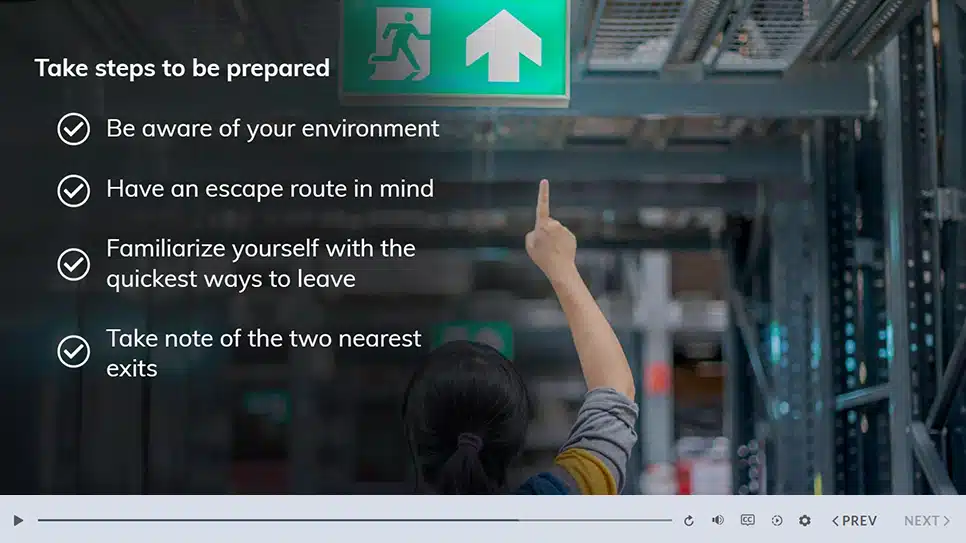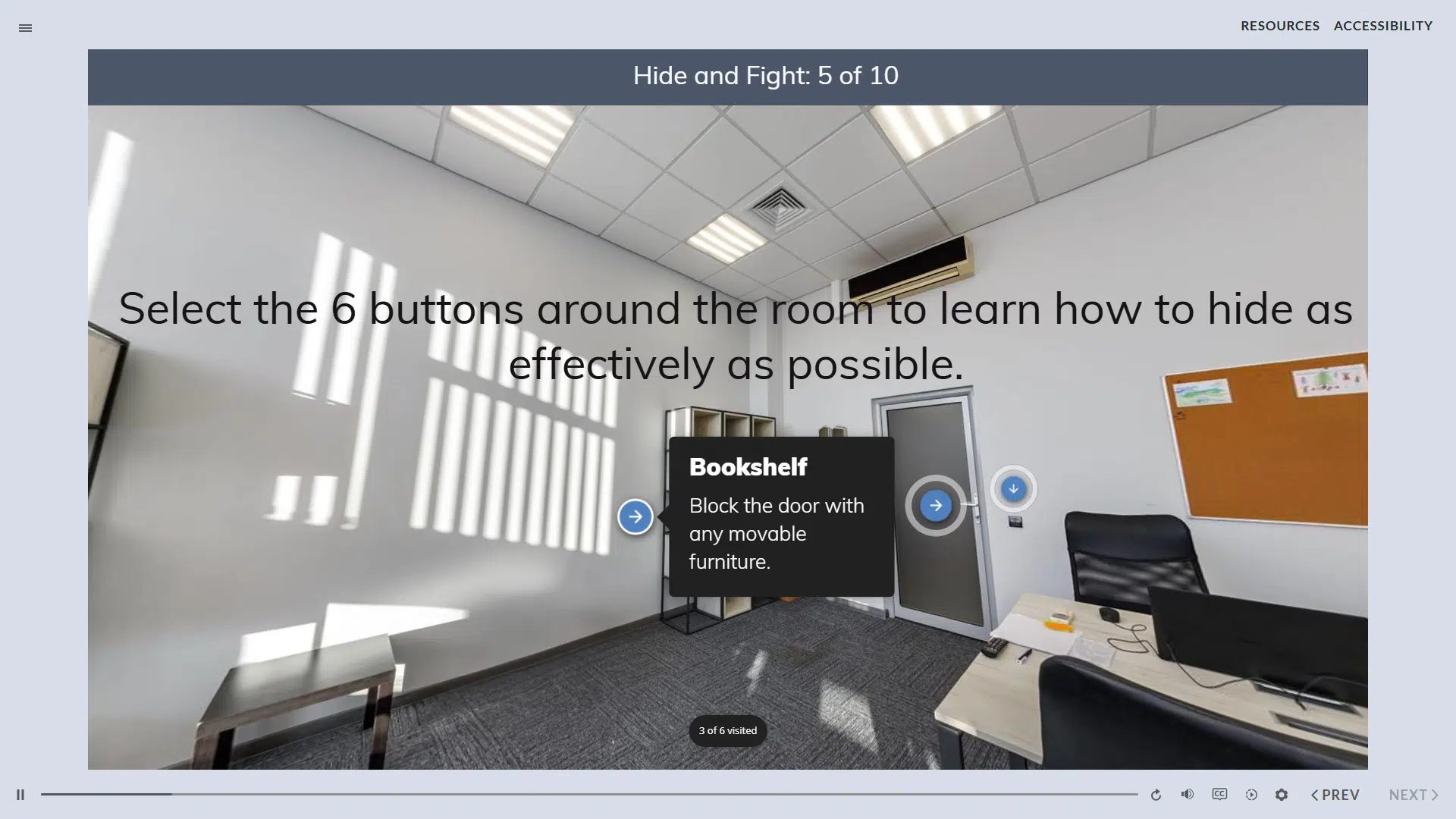
Active Shooter Response Training Course
Help your employees recognize signs of potential workplace violence and understand their role in an active shooter situation.
Course description
Traliant’s Active Shooter Response training is a 25-minute interactive course that helps employees preemptively prepare for a potential active shooter situation in the workplace. The course uses the FBI-recommended “Run, Hide, Fight” response method, which provides a clear and effective strategy for handling such critical situations. Through this training, learners will follow three main characters as they navigate a series of realistic scenarios, receiving practical guidance on how to respond to different active shooter situations, including how to interact with police and other emergency personnel.
ONLINE TRAINING
Active Shooter Response Training Course

The Active Shooter Response Training covers these topics and more:
- What is an active shooter?
- Preparing for an active shooter situation
- Best ways to exit
- Recognizing gunshot sounds
- Making choices about running vs. hiding, leaving belongings, helping/warning others, calling 911
- Best practices for hiding
- Interacting with emergency personnel
- Making a plan to fight
THE TRALIANT DIFFERENCE
Compliance you can trust.
Training you will love.

Legal expertise
Our in-house legal team monitors the latest laws, rules and regulations, so you don't have to. You can rest assured that our courses are continuously compliant.

Brilliant training
Take your training from boring to brilliant. With cinematic-quality videos produced by our Hollywood-based team, your employees will love our customizable, interactive, story-based training.

Valued partnership
Our main focus? It’s all about making your job easier. We do that with unmatched responsiveness and seamless deployment, dedicated to driving your success.

Meaningful impact
We don’t just deliver brilliant training, we help you create meaningful impact by broadening your employees' perspectives, achieving compliance and elevating culture.
KEY FEATURES
Why you'll love our training
It’s time to embrace a new era of online training with a valued partner who will ensure seamless implementation, a truly enjoyable learning experience, and courses with continuous compliance you can trust.
Compliance expertise
Traliant's in-house legal expertise ensures training is accurate and kept up-to-date with any regulatory changes.
Accessible to users with disabilities
Traliant provides an inclusive experience for all users, including those with disabilities, by going beyond Section 508-C standards and offering WCAG 2.1/2.2 AA.
Story-based learning
Our story-based approach blends leading instructional design with Hollywood talent to produce engaging, interactive and nuanced training.
Course administration
Traliant makes it simple to roll out training to your workplace and provide technical support directly to your employees at no additional cost.
Course customizations
Tailor courses to include your logo, relevant policies, workplace images, and more. Traliant can even customize the course with scenarios that take place in your own workplace environment.
Translations
Training is available in English, Spanish and is supported in over 100 languages.
COMPLIANCE EXPERTISE
Your partner in training compliance

Uniquely qualified in-house compliance team
Our exceptional in-house Compliance Advisory Team is led by Michael Johnson, Chief Strategy Officer and former U.S. Department of Justice attorney who has provided training and guidance to organizations like the Equal Employment Opportunity Commission, Google, the United Nations, and the World Bank.

Keeping you compliant, effortlessly
Keeping up with the complex web of employment laws — especially if your workforce spans multiple states — can be tricky. That’s why we offer a streamlined training solution that ensures you stay compliant with federal, state, and local regulations, so you can focus on what matters most: your team.

Simplifying your policies and handbooks
Crafting an employee handbook that meets legal standards can be daunting. Let us ease the burden. We help you navigate regulatory changes to ensure your policies and handbooks not only comply with the law but also reflect industry best practices.
What to consider when choosing the most effective active shooter response training

- Protect employees: Training equips employees with the knowledge and skills they need to recognize potential threats, respond appropriately, and protect themselves and others in a dangerous situation.
- Reduce the risk of injury: Active shooter training can help to minimize the potential for injury or death by empowering employees to react quickly and effectively.
- Create a sense of preparedness: Training helps to create a sense of preparedness and confidence among employees, which can help to reduce fear and anxiety in the event of a real emergency.
- Empower employees: Training provides employees with the information and skills they need to act quickly and confidently in the event of a real-life active shooter situation.
- Strengthen your organization's emergency plan: Active shooter training helps to integrate into and strengthen your existing emergency plan, providing employees with clear guidance and procedures.
- Build a culture of safety: Training reinforces a culture of safety and preparedness within your workplace.
- Run: If possible, evacuate the area quickly and safely.
- Hide: If evacuation isn't possible, find a safe place to hide and lock or barricade the door.
- Fight: As a last resort, if you are unable to run or hide, fight back against the attacker to defend yourself and others.
- Choose a safe location: Select a place that is difficult to access and offers some protection.
- Lock or barricade the door: Use any available means to secure the space.
- Turn off the lights: Minimize your visibility.
- Stay silent: Avoid making noise that could attract the attacker.
- Follow their instructions: Law enforcement officers will likely be armed and moving quickly. It's essential to follow their commands and to stay calm.
- Keep your hands visible: Avoid sudden movements that could be misinterpreted.
- Identify yourself: Let officers know that you are a member of the organization and that you are not a threat.
- Provide information: If possible, provide officers with information about the shooter's location, their appearance, or any other relevant details.
- OSHA's General Duty Clause (Section 5(a)(1) of the Occupational Safety and Health Act) requires employers to provide a workplace that is free from recognized hazards likely to cause death or serious harm.
- This clause has been interpreted to mean that employers should take steps to prepare for and address workplace violence, which can include active shooter situations.
- State and Industry-Specific Requirements:
- Some states or industries (e.g., healthcare, education, and government facilities) may have specific mandates or recommendations for workplace violence prevention and active shooter training.
- Voluntary Best Practices:
- Many organizations implement active shooter response training based on guidance from FEMA, OSHA, and the Department of Homeland Security (DHS), which recommend preparedness plans and training to ensure employee safety.
Employers are encouraged to provide active shooter response training as part of their workplace violence prevention programs to improve preparedness and compliance with safety obligations under OSHA's General Duty Clause.






